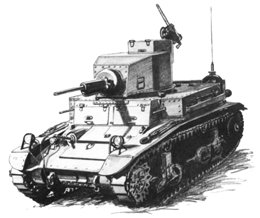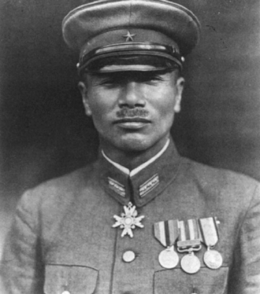 >
>Lieutenant Colonel Lenard B. Cresswell's 1st Battalion, 1st Marines moved upstream on the Ilu at daybreak, waded across the sluggish, 50-foot-wide stream, and moved on the flank of the Japanese. Wildcats from VMF-223 strafed the beleaguered enemy force. Five light tanks blasted the retreating Japanese. By 1700, as the sun was setting, the battle ended.

U.S. M-3 Light Tank
Colonel Ichiki*, disgraced in his own mind by his defeat, burned his regimental colors and shot himself. Close to 800 of his men joined him in death. The few survivors fled eastward towards Taivu Point. Rear Admiral Raizo Tanaka, whose reinforcement force of transports and destroyers was largely responsible for the subsequent Japanese troop build-up on Guadalcanal, recognized that the unsupported Japanese attack was sheer folly and reflected that "this tragedy should have taught us the hopelessness of bamboo spear tactics." Fortunately for the Marines, Ichiki's overconfidence was not unique among Japanese commanders.
Following the 1st Marines' tangle with the Ichiki detachment, General Vandegrift was inspired to write the Marine Commandant, Lieutenant General Thomas Holcomb, and report: "These youngsters are the darndest people when they get started you ever saw." And all the Marines on the island, young and old, tyro and veteran, were becoming accomplished jungle fighters. They were no longer "trigger happy" as many had been in their first days shore, shooting at shadows and imagined enemy. They were waiting for targets, patrolling with enthusiasm, sure of themselves. The misnamed Battle of the Tenaru had cost Colonel Hunt's regiment 34 killed in action and 75 wounded. All the division's Marines now felt they were bloodied. What the men on Tulagi, Gavutu, and Tanambogo and those of the Ilu had done was prove that the 1st Marine Division would hold fast to what it had won.

Col. Ichiki
* This was the same Ichiki who commanded the Japanese troops at the Marco Polo Bridge in 1937 during the beginning of the "China Incident" which led directly to the Second World War